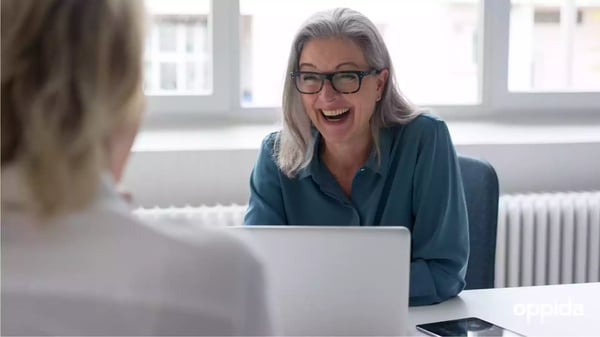In today's digital age, it’s very likely that the first thing you do in the morning when you wake...
Alternative models to higher education
Oppida’s CEO Bianca Raby sat down with C2People CEO and founder Allyn Radford to chat about alternative models to higher education, and how C2People is working to empower people to realise their aspirational goals, lifelong career journeys and personal growth.
Allyn Radford has been involved in the use of technology in learning for more than 30 years across a range of industries including education, defense, aerospace and government. During that time, he has worked for organisations such as University of Melbourne, RMIT University, Open Learning Australia (now Open Universities Australia), HarvestRoad Ltd, Cisco, and the Australian Computer Society. He has led projects in Australia, the United States, Mexico and South Korea.
As inaugural CEO of DeakinDigital, a wholly owned subsidiary of Deakin University, he led innovation in the development and implementation of Alternative Digital Credentials (ADCs) and developed the world’s first Masters of Professional Practice degrees based on ADCs together with Deakin University. In 2020 he also launched a new startup, C2People, which is focused on career credentialing and career mapping in a powerful consortium of Australian and international companies working towards common goals.

C2People and credentialing
Bianca: Hi Allyn, welcome to this conversation about C2People. It’s lovely to have you.
First of all, can you please introduce yourself very briefly, and also tell us what C2People’s value proposition is?
Allyn: My name is Allyn Radford and I’ve been involved in education from all different perspectives for most of my working life—from fee-for-service technology companies, large technology companies, small technology companies and several different universities. That has shaped my thinking about the journey that we’ve gone on, where we are now and what we need to do for the future. So the vision for C2People is very much bound up within the whole credentialing space, and we do actually have a vision statement:
“We empower the career aspirations of the people that make companies great and enable the companies to liberate that power.”
Bianca: Wow. What a statement!
Allyn: So bound up within that obviously there’s a lot of subtext, there’s a lot of sub-narratives, there’s all sorts of things going on. But that’s our vision and that’s where we want to go over a period of time. And we’re at the beginning of that, but with a lot of experience being brought to the table from credentialing and how alternative educational models might work.

Why do we need alternative models of higher education?
Bianca: Why is it so important that we start looking at these alternative models of higher education?
Allyn: Looking at alternative models of higher education is a slightly different statement to looking at alternative models to higher education. When you think about higher education, it has already been pushed around a lot during this year because of the pandemic etc. They’ve had the potential to change for quite some time and they haven’t, and really, it took a cataclysmic global pandemic to make them change at all. And in the space of three weeks they’ve gone from online learning being the tool of the devil to, all of a sudden, this is what saved us, and this is reflected in what they’re doing at the moment.
The real challenge is that higher education has been built with an episodic long-term model in its very being. So you go to university for three years or five years, you come out with a qualification or two qualifications, and that’s supposed to gear you for the rest of your working life. And we know that no longer makes sense. We have to do something drastically different: to be able to respond to the current needs, to the impacts of the fourth industrial revolution, to what’s happened with automation and jobs, and particularly, to the need to continuously reassert your employability. And that’s the critical piece and they can’t do that with it with a qualification model the way it currently stands.
Bianca: I like the way you say episodic—that’s a really nice way of explaining it, actually. I haven’t heard it being used for that but it is. It’s not conducive to being able to react and upskill as technology changes, right?
Allyn: Yes, we know that universities focus on their intake, so students engage with universities for a period of time, and then graduates leave and universities have a difficult time getting them back. Which is why they’ve done odd things like put a master’s degree on the back of a bachelor’s degree to try and keep them there for a couple of years longer because that’s better for their bottom line. When in actual fact, it’s just a completely broken model to do that. So, it’s full of challenges and the episodic nature of it is not supportive of lifelong learning at all. We need things that are more granular, more engaging, that will transition as people transition in their careers. All the impacts of the changes in technology really disrupt what jobs are like at the moment, and they don’t do that very well.
Bianca: Exactly! The other thing is that the university model doesn’t traditionally take into account the workplace learning that occurs. But a credentialing model that has that workplace element, which we know is about 70% of our learning, allows for it to be appreciated and acknowledged.

Informal and non-formal learning
Allyn: The informal and non-formal learning components are extremely important. At Harvard Graduate School of Education, they focus on the fact that humans are really built to learn from beginning to end. And that is not well recognised. One of the reasons that it’s not well recognised in higher education is because it tears away at the bottom line.
Their business model is a human in a seat for a period of time, and anything that challenges that is not going to be well accepted, and that’s the headspace at the moment. What will happen is, what we’re seeing at the moment, is where companies go out and do for themselves.
Amazon is spending $700 million on upskilling people, turning around and saying, ‘we will take you through a shorter programme and treat it as if you had a degree-level qualification’. Of course universities misinterpret that and say, ‘oh, you can’t do a degree in six months’, and no, that’s not what Amazon is saying. What they are saying is that we will give you the same access to the jobs that you would have if you had a bachelor’s degree, and the full expectation is, we will continue to take you on your lifelong journey.
Bianca: And this is what true disruption is? True disruption, when you actually take a market that wasn’t there and you turn it into a market, and that’s kind of what you are doing. You’re saying, ‘we’re going to give you a different, a complete, alternative’ which opens up a brand new market for their employees, right?
Allyn: Exactly. This is not unique. There are now quite a large number of companies that say, ‘you no longer have to have a bachelor’s degree to come and work with us’. And so not having a bachelor’s degree, but having the right set of skills, having the right talent profile, which is really important, will get you through the door, and then it’s up to you what you do from that point onwards. Clearly you’re not going to get a job with IBM Research, which is the world’s largest research organisation, if you don’t have at least a PhD, because that shows your focus in exactly what it is that they are trying to discover and reinvent. But you can get a job in IBM through their New Collar programme without any degree whatsoever, so it’s horses for courses.

What are you excited about in digital education?
Bianca: Amazing. So my last question is, what are you excited about in digital education?
Allyn: There’s a lot to be excited about! I think there are so many things that have evolved very strongly. I think we are in that phase where there will be disruption caused by technology and credentialing and all sorts of other new capabilities that we have. That will cause universities to reflect differently on how they respond to that, over the next few years or so. It might take a bit longer, but the capabilities, as we begin to see the existing technology brought together with AI and different credentialing models, are going to create a vastly different opportunity space for people to engage. I think we can be more responsive to the diversity programmes, to the different needs that people have, as they try to access work and their lifelong career options. That’s going to be very exciting.
Bianca: Amazing, yeah? That’s something that we’re also excited about. It’s about the reach and accessibility, the fact that we are now moving to a more flexible model which is going to open up for a lot of people some opportunities that they would never have had before with the traditional ‘have to come to a building and sit on a seat model’.
Allyn: Yeah!
Bianca: Thank you so much for your time and insights today Allyn. It’s been lovely talking to you and we wish you all the best with C2People, and we can’t wait to work together someday.
Allyn: Thanks very much. Me too!



